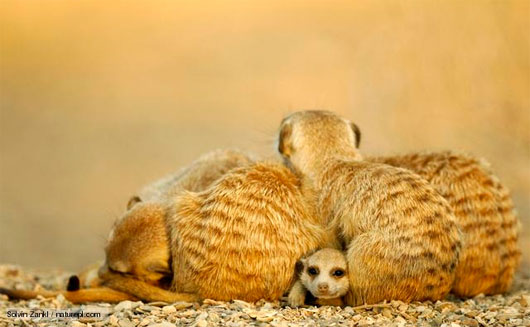Extraordinary sleeping habits in animals
A new documentary has revealed, animals also have strange sleeping habits, such as dolphins that just swim, sleep with half the brain in a wakeful state or some birds wake up with one eye aim, one eye open .
Scientists have conducted sleep studies of different animals in an attempt to compare and find ways to treat sleep disorders in humans. They used high-tech cameras to explore how animals, from red pandas to meerkat civets and tapirs, spent the night at the Bristol zoo (UK).
The team found that, during sleep, both humans and some animals such as octopus and squid showed rapid eye movements, which were associated with deep sleep and dreams.

Meerkat civets are always lying on top of each other to sleep and ears are always pricked up to listen to strange noises.(Photo: Corbis)
When deep asleep, dogs even bark and pull their legs to run in a lying position, while the duckling mound simulates how to kill crustaceans. A dog and a cat were turned back to the camera while going to sleep while sleeping.
The team discovered that the sleep of each animal is influenced by their viability in the environment. Animals are most likely to become prey, will sleep less than other animals at the beginning of the food chain.
For example, the meerkat civets have a habit of lying on top of each other in their nests to sleep, with one ear always perking up to listen to danger. In it, the queen in the herd will be in the middle and have the deepest sleep. The civet holding the guard position will sleep on the outside and always wake up first if there is any sound.
Some birds, such as flamingos, have a one-eyed, one-eyed sleeping style to keep watch for predators at night. Meanwhile, the golden squirrel mice have a special ability to balance on a tree branch during sleep and any slightest movement causes them to wake up immediately.
In order to remain alert, baboon monkey Papio papio Africa has a sleeping posture on a ridiculous heel, making it difficult to sleep deeply.

The two hemispheres of the dolphin alternate with each other so they can still swim and breathe while sleeping.(Photo: Corbis)
Some marine animals, such as dolphins, also have a rather unusual sleeping habit. Dolphins will let the two hemispheres take turns to awake so that they can still swim and breathe while sleeping.
The researchers said that the amount of sleep time of animals also depends on their metabolic rate. Smaller animals tend to need more sleep, except for some of the top "hunters", as big as lions, which sleep more than 8 hours a day.
Animals that eat grass like giraffes and cows spend a lot of time eating so much, they have no time to sleep. For example, giraffes usually sleep only 2 hours a night and can stay awake for weeks without any harm.
All the findings were used to build a new documentary, about to be broadcast on BBC channel.
- Elon Musk has a horrible sleeping habit, don't follow it!
- Sleep on the weekend - should it?
- Dangerous sleeping habits you may not know
- Sleep habits make your body weaker and weaker
- Guess the puppy's personality through the 6 most popular sleeping postures
- Health habits to avoid during holidays and Tet
- The habit of causing harm to the cold day
- Do not wear a bra and keep your head high when sleeping
- Decode 6 ugly habits of people
- Animals open one eye while sleeping
- People have nighttime sleeping habits thanks to ... extinct dinosaurs?
- Do to the mind sharp?
 Animal 'suffering' after hibernation
Animal 'suffering' after hibernation Why do goats climb well?
Why do goats climb well? Scientists were surprised to see chimpanzees eating turtles
Scientists were surprised to see chimpanzees eating turtles Giant catfish died deadly due to drought in Thailand
Giant catfish died deadly due to drought in Thailand